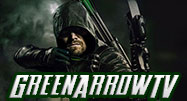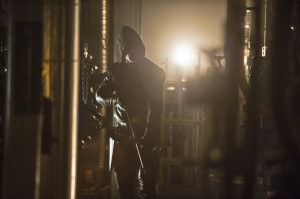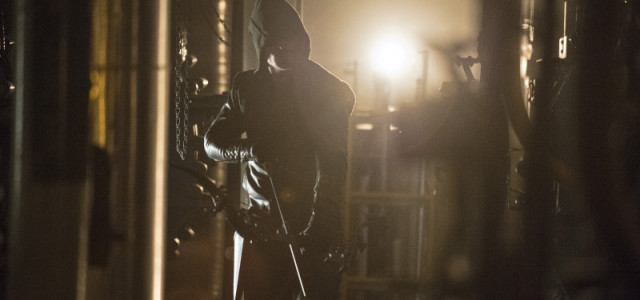
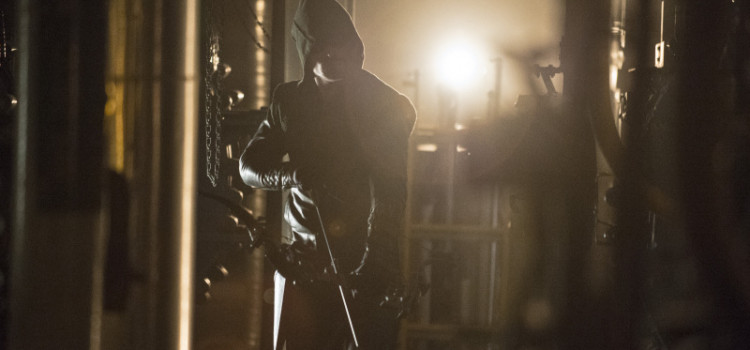
Arrow #2.23 “Unthinkable” Recap & Review (Derek’s View)
Recaps & Reviews May 19, 2014 Derek B. Gayle

Both of GreenArrowTV’s reviewers are taking on the Arrow season finale. Check out Matt Tucker’s review here!
Summary: Season 2 closes off a long arc for Oliver, and still has time to give nearly every character a big moment in a jam-packed finale that subverts expectations.
If you have not seen this episode yet and do not wish to be spoiled, do not continue reading!
Recap
The cure works on Roy, and Team Arrow embarks on a new mission: Cure the Mirakuru army. Sara arrives with Nyssa and the League of Assassins to stop the soldiers, and Lyla offers the Suicide Squad to stop Waller. Thea escapes Malcolm, who survived the gunshots thanks to Kevlar, but after meeting up with the cured Roy, she feels betrayed again when she discovers his bow and arrow in his apartment. With the help of Quentin and the police force, the expanded Team Arrow is able to take out all the soldiers, who gathered in the tunnel to further push Waller’s decision to bomb Starling. At A.R.G.U.S., Diggle, Lyla and Deadshot hold Waller at gunpoint to stop the bombing, and she reveals that Lyla is pregnant. Oliver discovers that Laurel has been kidnapped by Slade, and forces Felicity to stay at his mansion because she’s the woman he truly loves. When Oliver makes it to Slade, he finds both Felicity and Laurel in his grasp. However, Felicity stabs Slade with the cure—Oliver knew of the bugs in the mansion, and staged the “I love you” moment so Slade would kidnap Felicity. With Slade brought back down to normal, Oliver and Slade viciously fight; Oliver gains the upper hand, and even with Slade’s taunts, he does not kill him. Oliver tells Waller to call off the airstrike with Slade apprehended, and he is subsequently put into a maximum security A.R.G.U.S. prison on Lian Yu. Sara leaves with the League, the trade for their help being that she must re-join them, but bids goodbye to her father and sister this time. However, after she leaves, Quentin collapses, having suffered an injury from his previous encounter with a Mirakuru soldier. Thea leaves with Malcolm, leaving a note for Roy that she is no longer the Thea Queen she once was. In the flashback, Oliver kills Slade and the freighter sinks, but he is rescued by Amanda Waller, and awakens in Hong Kong.
Review
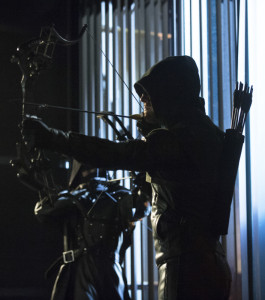 In a lot of ways, “Unthinkable” is the antithesis of last season’s “Sacrifice,” the main reason being that everyone actually ends in a pretty good or safe place. Well, okay—Quentin has a critical injury, and Thea has put on the black leather and is crossing over to the dark side. But it’s doubtful Quentin will be dead when the third season premieres, and Thea is, at least, not in mortal danger at the moment. It’s certainly not ideal, but it’s miles above the danger and turmoil every single character faced this time last year. Oliver, Felicity, and Diggle are without an impending disaster to thwart for once, and have time to breathe and recoup. Diggle even has a baby on the way. Roy may be broken up about Thea, but he’s been accepted as a hero without the strings of the Mirakuru. Sara is deciding her own fate, and might be a force for good within the League. Laurel and Quentin get to bid her a proper goodbye, knowing they’ll see her again. Thea isn’t exactly going in a good direction, but she’s making her own decisions, which is important. As catastrophic as these last few episodes have been, “Unthinkable” is remarkably hopeful for everyone—even Slade can maybe, someday, redeem himself down the line.
In a lot of ways, “Unthinkable” is the antithesis of last season’s “Sacrifice,” the main reason being that everyone actually ends in a pretty good or safe place. Well, okay—Quentin has a critical injury, and Thea has put on the black leather and is crossing over to the dark side. But it’s doubtful Quentin will be dead when the third season premieres, and Thea is, at least, not in mortal danger at the moment. It’s certainly not ideal, but it’s miles above the danger and turmoil every single character faced this time last year. Oliver, Felicity, and Diggle are without an impending disaster to thwart for once, and have time to breathe and recoup. Diggle even has a baby on the way. Roy may be broken up about Thea, but he’s been accepted as a hero without the strings of the Mirakuru. Sara is deciding her own fate, and might be a force for good within the League. Laurel and Quentin get to bid her a proper goodbye, knowing they’ll see her again. Thea isn’t exactly going in a good direction, but she’s making her own decisions, which is important. As catastrophic as these last few episodes have been, “Unthinkable” is remarkably hopeful for everyone—even Slade can maybe, someday, redeem himself down the line.
There’s a feeling that the possibilities are endless from here on out, which is odd considering how many teases we get of the following season. The lightning-fast pace of the episode allows Slade to be defeated with plenty of time to spare, so the final ten minutes are devoted less to cliffhangers and more to setting-up the kinds of dynamics we’ll see next year. A.R.G.U.S. is definitely going to play a larger role, considering the Amanda Waller/Hong Kong reveal is used as the final cliffhanger of the season. It’s not a terribly strong place to end, simply because we all knew Oliver and Waller met in the past, and its been hinted at multiple times that Oliver spent plenty of time off Lian Yu. But it and the aforementioned character points are glimpses of the exact stories we’re sure to see next season, even if they aren’t totally surprising. While “Sacrifice” was devastating with how much was left open and vague, “Unthinkable” answers a lot of questions, and allows even the darker developments to not seem so terrifying. We know fairly well where the characters are going next, and it doesn’t totally blow up the status quo. Instead, “Unthinkable” is a cap to this season’s long-term story, and completes a part of the journey Oliver has been on since the pilot.
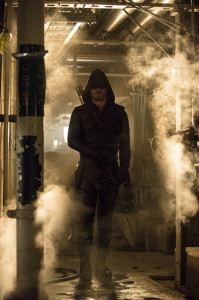 The first two seasons of the show have seen Oliver learn the difference between survival, revenge, and heroism—compare the list-following Oliver who was even reluctant about stopping bank robberies to the guilt-ridden but altruistic Oliver of now. Season 2 has been more than a little obvious about Oliver’s heroic journey, but that type of journey is hard to be subtle about in a world with actual costumed heroes. It’s made it very easy to track this season, though, with key points like “City of Heroes” addressing the need for the Hood to be a hero, “Three Ghosts” highlighting why he honors the dead, and “Deathstroke” reminding him he’s still fallible. That last one is the thread carried through this finale, which forces Oliver to question that fallibility. As Sara says, “If you’re facing the unthinkable, you have to be prepared to do the unthinkable.” The murder question has been at the crux of Oliver’s heroic journey since we first saw him snap that kidnapper’s neck in the first episode, and as such this season’s “no-kill rule” has been the representation of how the Arrow is different from the Hood. There’s plenty of small ways you could feasibly differentiate the two, but that rule created a singular, physical goal, not unlike the list was in the first season. And while Oliver will, of course, be in future situations where he’ll have to find a creative solution to not kill, “Unthinkable” still completes that story by answering the big question: Is killing a better solution for Oliver or not?
The first two seasons of the show have seen Oliver learn the difference between survival, revenge, and heroism—compare the list-following Oliver who was even reluctant about stopping bank robberies to the guilt-ridden but altruistic Oliver of now. Season 2 has been more than a little obvious about Oliver’s heroic journey, but that type of journey is hard to be subtle about in a world with actual costumed heroes. It’s made it very easy to track this season, though, with key points like “City of Heroes” addressing the need for the Hood to be a hero, “Three Ghosts” highlighting why he honors the dead, and “Deathstroke” reminding him he’s still fallible. That last one is the thread carried through this finale, which forces Oliver to question that fallibility. As Sara says, “If you’re facing the unthinkable, you have to be prepared to do the unthinkable.” The murder question has been at the crux of Oliver’s heroic journey since we first saw him snap that kidnapper’s neck in the first episode, and as such this season’s “no-kill rule” has been the representation of how the Arrow is different from the Hood. There’s plenty of small ways you could feasibly differentiate the two, but that rule created a singular, physical goal, not unlike the list was in the first season. And while Oliver will, of course, be in future situations where he’ll have to find a creative solution to not kill, “Unthinkable” still completes that story by answering the big question: Is killing a better solution for Oliver or not?
The show doesn’t discount the idea of killing completely; Quentin’s big heroic moment has him blowing up a soldier, and it’s not played as being a bad thing. And just back in “City of Blood” Oliver had every intention of dropping concrete on fifty soldiers with the rationalization that they weren’t men anymore (though it should noted that with that plan’s failure, he was able to cure more.) And technically he’s been fighting alongside people like Sara and Diggle, both of whom have been trained specifically to kill as an assassin and solider, respectively. But the question is if killing is better for the Arrow as the superhero and for Oliver as a person. When Oliver was a killer, did things go any more smoothly than they have this season?
Season one, with its high body count, ended with the team utterly losing, and the Big Bad still survived to be a series regular for season 3. In the flashback, Oliver chose to kill Slade—though as we finally see, Slade egged him on so relentlessly that it’s completely understandable why he’d choose to kill him at that point. And yet, that choice completely blew up in his face in every way. In retrospect, the writing was on the wall: killing has only led to failure for Oliver. He hasn’t been fighting with one hand tied behind his back this year, he just hasn’t been thinking creatively enough. “Unthinkable” still has Oliver doing the unthinkable, but the twist lies in how that word is defined: it’s unthinkable that Oliver would be able to so bluntly open up in CW-fashion at this stage, it’s unthinkable that he’d be so willing to put his teammates in danger, it’s unthinkable that a plan with such a high percent of error could work. But all those things do work, and there’s a distinct lack of tragedy at the end. These are the kinds of ridiculous, comic book-y plans Oliver needs to be confident enough to come up with, and he’s built a strong enough Team Arrow to make them work. He just needed to trust that they would, and after a season full of guilt and doubting his faults, it’s satisfying to see him finally trust his choices so thoroughly. As a result, every single member of the main cast survives (Quentin pending.)
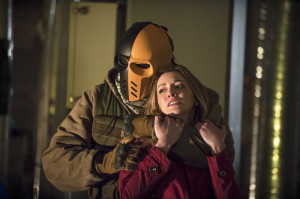 It’s not as if Oliver is the only one who gets material, and “Unthinkable” does a competent job of giving everyone something to do, sans Laurel perhaps. Even though Laurel is relegated to nothing more than a plot device (she gets drugged…only to wake up and be kidnapped by someone else) she did get big bits of development over the past couple of weeks. And her kidnapping does give Quentin a reason to be on the “murder is justified” side of the argument, and Paul Blackthorne plays that believably. And there’s that anvilicious tease of Sara passing down her coveted leather jacket, which neither confirms nor denies any theory for how the Canary will play out, but certainly provides fuel for those theories. I posed last week that we could very well end up with a dual-Canary with aspects permanently split between Laurel and Sara rather than one of them dying, and the pass-down could go either way. Laurel is back at a place where her character could feasibly go in any direction at season’s start, which is exciting considering how much time has been spent attempting to redeem her character or give her some focus. She’s really the only one without a clear place to go next year, which is odd, but that also makes her a bit of a wild card. Likewise for Sara, who has a more clear direction with the League, but could feasibly return at any point the show needs her too. As controversial as the Canary material has been this year, it ends the season in a good place, with both Sara and Laurel aware of their faults and working towards redemption.
It’s not as if Oliver is the only one who gets material, and “Unthinkable” does a competent job of giving everyone something to do, sans Laurel perhaps. Even though Laurel is relegated to nothing more than a plot device (she gets drugged…only to wake up and be kidnapped by someone else) she did get big bits of development over the past couple of weeks. And her kidnapping does give Quentin a reason to be on the “murder is justified” side of the argument, and Paul Blackthorne plays that believably. And there’s that anvilicious tease of Sara passing down her coveted leather jacket, which neither confirms nor denies any theory for how the Canary will play out, but certainly provides fuel for those theories. I posed last week that we could very well end up with a dual-Canary with aspects permanently split between Laurel and Sara rather than one of them dying, and the pass-down could go either way. Laurel is back at a place where her character could feasibly go in any direction at season’s start, which is exciting considering how much time has been spent attempting to redeem her character or give her some focus. She’s really the only one without a clear place to go next year, which is odd, but that also makes her a bit of a wild card. Likewise for Sara, who has a more clear direction with the League, but could feasibly return at any point the show needs her too. As controversial as the Canary material has been this year, it ends the season in a good place, with both Sara and Laurel aware of their faults and working towards redemption.
Roy and Thea have much more straightfoward paths, it seems, but both are rife with potential drama. Roy getting his own mask is clearly a defining moment for him, and Colton Hayes does a lot with a little. Hayes has always made Roy instantly likeable, even when Roy is written as a bit of a stick in the mud, and he appropriately conveys Roy here as someone less interested in moping with guilt and more about taking action. It fits in with what we know of the proactive Roy, but it’s also nice contrast to the less-heroic motivations for him at episode’s end. Losing Thea will definitely fuel a darker slant to his actions, moreso when Thea inevitably plunges deeper into the dark side. It’s interesting that Roy doesn’t seem to be aware of exactly how much terror he caused in “Seeing Red”—being a cop killer, specifically—and that future reveal will surely only make things worse for him. There isn’t as much to say about Thea, who gets one last grasp at sticking on the good side, but throws it away in favor of Malcolm. There’s plenty of explanations for why Roy might have a case of arrows, but it’s clear that Thea went into the situation with uncertainty already. And while Kevlar is an easy solution for last week’s cliffhanger, it yields a much more interesting development—that Thea could fire the gun when Tommy couldn’t, and that makes her a stronger heir. It’s classic Luthor/Osborn stuff going on here, but it’s a kind of story that never gets old. And frankly, anything that gives more material to both John Barrowman and Willa Holland is far from unwelcome.
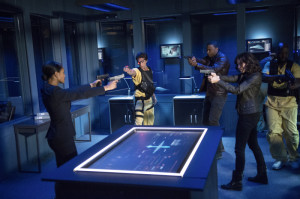 Pretty much every character gets some character beat, development, or contributes to the plot, and that’s saying something in an episode packed to the brim with guest stars. “Unthinkable” brings back all the key players in the season, and does so without it feeling like fanservice. Nyssa leads the League and represents the farthest side of the killing argument. Deadshot aids the Suicide Squad. Waller fuels the episode’s tension with her time limit. Shado’s vengeful ghost gets to egg on Slade and Oliver calls out the ridiculousness of it. Lyla shows up with a freakin’ rocket launcher, and also reveals she’s pregnant with Diggle’s baby. At points the action is so evenly divided that these characters only get a couple of moments, but no one really gets shafted, which is a huge feat for an episode featuring about 15 primary characters.
Pretty much every character gets some character beat, development, or contributes to the plot, and that’s saying something in an episode packed to the brim with guest stars. “Unthinkable” brings back all the key players in the season, and does so without it feeling like fanservice. Nyssa leads the League and represents the farthest side of the killing argument. Deadshot aids the Suicide Squad. Waller fuels the episode’s tension with her time limit. Shado’s vengeful ghost gets to egg on Slade and Oliver calls out the ridiculousness of it. Lyla shows up with a freakin’ rocket launcher, and also reveals she’s pregnant with Diggle’s baby. At points the action is so evenly divided that these characters only get a couple of moments, but no one really gets shafted, which is a huge feat for an episode featuring about 15 primary characters.
If anyone got the shaft towards the end of the season, it might be Slade himself, oddly enough. That sounds crazy considering he became the primary villain for the second half, but as I mentioned last week, we really haven’t learned much about him since season one. Deathstroke has been a villain of rage, and the reason to fear him is because there is so little to him outside of his intense hatred of Oliver. That’s made him the show’s scariest and most relentless villain, but that’s also made Slade a bit lost as a character. And yet, a relentless villain is exactly what this season needed to tell its story about Oliver—creating such a monster that we could feasibly side against Oliver for not killing him—but hopefully with Slade’s survival, we can learn more about him down the line. That said, this entire arc would not have worked had it not been for Manu Bennett, who ultimately revealed himself as a tour-de-force of charisma for the monstrous Deathstroke. Bennett pretty much follows a checklist of “ways to look evil,” but the guy sells it so well that his gravelly Batman voice is, honestly, as scary as it’s meant to be.
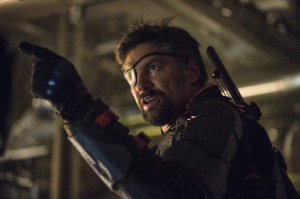 Bennett’s physicality makes his battle with Oliver that much better—and let’s not discount Stephen Amell’s obvious physical prowess, or the phenomenal fight choreography and stunt team. The fight between Oliver and Slade isn’t the most mindblowing fight on television, but that’s mostly because every fight on Arrow is generally choreographed to perfection. But it’s taken up a few notches in its presentation, with the glorious intercuts between past and present. Not only do we get to see both Deathstroke masks, but it becomes the best and most creative use of flashbacks to date. The show has always had problems with keeping the flashbacks relevant; even this year’s more entertaining flashback stories still suffered from “revealing” twists that were already revealed by characters in the present, because it was forced to tell things chronologically rather than when they’d better tie into the present day. But if they must show us things we already know, at least they can still make them interesting at times—and the beautifully executed past/present fight is exactly the kind of way to do it. As for Slade’s arc, Oliver gets the best revenge, first with the reveal that it is Slade’s fault that he let himself unnecessarily succumb to rage (“The Mirakuru isn’t what made me hate you!”) and then with Oliver’s declaration that Slade only helped him become a hero.
Bennett’s physicality makes his battle with Oliver that much better—and let’s not discount Stephen Amell’s obvious physical prowess, or the phenomenal fight choreography and stunt team. The fight between Oliver and Slade isn’t the most mindblowing fight on television, but that’s mostly because every fight on Arrow is generally choreographed to perfection. But it’s taken up a few notches in its presentation, with the glorious intercuts between past and present. Not only do we get to see both Deathstroke masks, but it becomes the best and most creative use of flashbacks to date. The show has always had problems with keeping the flashbacks relevant; even this year’s more entertaining flashback stories still suffered from “revealing” twists that were already revealed by characters in the present, because it was forced to tell things chronologically rather than when they’d better tie into the present day. But if they must show us things we already know, at least they can still make them interesting at times—and the beautifully executed past/present fight is exactly the kind of way to do it. As for Slade’s arc, Oliver gets the best revenge, first with the reveal that it is Slade’s fault that he let himself unnecessarily succumb to rage (“The Mirakuru isn’t what made me hate you!”) and then with Oliver’s declaration that Slade only helped him become a hero.
And of course, there’s the plan that defeated Slade, which involves Oliver declaring his love for Felicity in full TV drama fashion. It’s a ballsy move for a show that’s been slowly building a more volatile side of its fanbase, even moreso considering how quickly it undoes that move with an arguably more ballsy move. It’s not an uncommon ploy for a will they/won’t they situation on a show, a temporary discharge for some of the tension without necessarily altering the status quo right then and there. Oliver and Felicity is a different situation from the likes of Sam and Diane or Mulder and Scully for a few reasons, of course, being that this an adaptation of a known mythology and there’s a large selection of potential suitors for Oliver that we know he has/had feelings for. We never really had to worry that, say, Chuck and Sarah would actually end up with Kristin Kreuk and Brandon Routh, respectively (though some viewers certainly did at the time, for whatever reason.) But it’s up in the air for Oliver at this point, who ends the season with the same three major love interests alive and well.
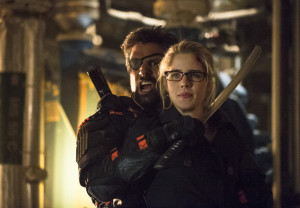 But beyond that, the scene in the mansion is multitudes more satisfying on second viewing; the music, old school WB-esque extreme close-ups, and awkward pauses are near-exact replicas of typical scenes in any given primetime soap opera. It’s essentially a restaging of Smallville‘s biggest loft scenes, with Rickards even delivering some Kristin Kreuk-like breathiness in her responses. This even takes place in roughly the same place Oliver and Laurel shared a big dramatic kiss last year, as if this place in the mansion was becoming Oliver’s own “loft.” The only thing missing is a sunset in the background, which might have happened had that “before dawn” bit not been established. That’s not meant to be an insult to any show; these kinds of melodramatic moments are perfect for the shows they belong in, and Arrow executes the big “hero declares his love during the final battle” moment about as well as it could. But the thing is, Arrow isn’t really that show—or at least, it isn’t here in season 2—and the lack of the show’s signature grit and subversion is the biggest clue to the final twist. It’s such a perfect scene for any other show, but while Arrow has the soap opera genre in its bones, the characters don’t necessarily live by those rules. Instead, the extreme close-ups and awkward pauses are to hide Oliver slipping the cure; the soapy dialogue is code for the plan; Felicity’s exhale at the end is her acknowledgement of the gravity and danger of the plan, not their change in relationship. And Oliver, especially, isn’t capable of expressing himself like that just yet, not without some ruse or ulterior motive. It’s sort of a parody of this kind of scene, but in a way that both highlights where Oliver and Felicity both are, and where they’d need to eventually be for a moment like this to work. It’s quite brilliant how well this plays out over the grand scheme.
But beyond that, the scene in the mansion is multitudes more satisfying on second viewing; the music, old school WB-esque extreme close-ups, and awkward pauses are near-exact replicas of typical scenes in any given primetime soap opera. It’s essentially a restaging of Smallville‘s biggest loft scenes, with Rickards even delivering some Kristin Kreuk-like breathiness in her responses. This even takes place in roughly the same place Oliver and Laurel shared a big dramatic kiss last year, as if this place in the mansion was becoming Oliver’s own “loft.” The only thing missing is a sunset in the background, which might have happened had that “before dawn” bit not been established. That’s not meant to be an insult to any show; these kinds of melodramatic moments are perfect for the shows they belong in, and Arrow executes the big “hero declares his love during the final battle” moment about as well as it could. But the thing is, Arrow isn’t really that show—or at least, it isn’t here in season 2—and the lack of the show’s signature grit and subversion is the biggest clue to the final twist. It’s such a perfect scene for any other show, but while Arrow has the soap opera genre in its bones, the characters don’t necessarily live by those rules. Instead, the extreme close-ups and awkward pauses are to hide Oliver slipping the cure; the soapy dialogue is code for the plan; Felicity’s exhale at the end is her acknowledgement of the gravity and danger of the plan, not their change in relationship. And Oliver, especially, isn’t capable of expressing himself like that just yet, not without some ruse or ulterior motive. It’s sort of a parody of this kind of scene, but in a way that both highlights where Oliver and Felicity both are, and where they’d need to eventually be for a moment like this to work. It’s quite brilliant how well this plays out over the grand scheme.
This season has been playful with who Oliver loves most, especially considering last week’s triple-decker ship tease, and plays coy by not really answering the question. But what “Unthinkable” makes clear is that Oliver does love everyone in his life, at least as much as a man like him is capable of it at this point. The brick wall for Oliver has nothing to do secret identities or danger anymore—everyone knows, and everyone has been courageous in the face of danger and survived—it’s the question of how any of these relationships could work. More to the point, Oliver has been his own agent of change throughout the past two years; the man he was when he, for example, crashed and burned with Laurel at the end of last year, is different than the man he is now. But that doesn’t mean he’s ready for any of them, and that’s why it’s fair to hold off on immediately hooking up with whomever he pleases at the end of the day. He’s a hero, but one with lots of issues and history we don’t know about. And if these past two years have been any indication, the man he’ll be this time next year won’t necessarily be the man he is now.
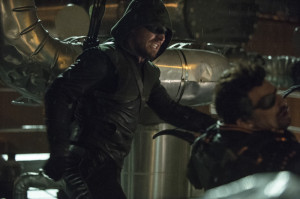 We don’t know if Slade made him figure out his feelings or not, but a long term lover isn’t what he needed after this season. What he needed was to regain his confidence and be a hero, and that’s what Slade’s big threat did. And while Oliver’s declaration was part of the plan, that’s still a very risky play to make, and will surely shift the dynamic between Oliver and Felicity next season, even if only slightly. In the whirlwind of the Deathstroke arc in the past four episodes, it’s easy to forget just how much things changed—Moira’s dead, Laurel’s in the know, Sara is on a less self-hating path, non-Mirakuru Roy is in Team Arrow, Quentin is in good graces with the police, Thea is with Malcolm, Diggle’s got a family on the way. “Unthinkable” doesn’t have too many world-shaking revelations that stick, but it’s got such a huge, movie-sized scale packed with fun moments that it’s impossible to detail everything that makes it so fun. More importantly, it finishes off a season that’s been gradually retooling itself over time. With the two-year story of Oliver becoming a hero completed, Season 3 will be a different beast for sure. But if this show has done anything well, it’s keep itself fresh.
We don’t know if Slade made him figure out his feelings or not, but a long term lover isn’t what he needed after this season. What he needed was to regain his confidence and be a hero, and that’s what Slade’s big threat did. And while Oliver’s declaration was part of the plan, that’s still a very risky play to make, and will surely shift the dynamic between Oliver and Felicity next season, even if only slightly. In the whirlwind of the Deathstroke arc in the past four episodes, it’s easy to forget just how much things changed—Moira’s dead, Laurel’s in the know, Sara is on a less self-hating path, non-Mirakuru Roy is in Team Arrow, Quentin is in good graces with the police, Thea is with Malcolm, Diggle’s got a family on the way. “Unthinkable” doesn’t have too many world-shaking revelations that stick, but it’s got such a huge, movie-sized scale packed with fun moments that it’s impossible to detail everything that makes it so fun. More importantly, it finishes off a season that’s been gradually retooling itself over time. With the two-year story of Oliver becoming a hero completed, Season 3 will be a different beast for sure. But if this show has done anything well, it’s keep itself fresh.
Odds & Ends
- After weeks without the “My name is Oliver Queen” opening, the recap this week drives straight into the episode’s beginning, further driving home how this episode is the conclusion of this long story.
- There’s a lot of cool stuff in this episode, but that “Til death do us part” line might have gone a little too far past the appropriate cheese limit.
- Isabel gets offed fairly unceremoniously, though it does give us a) One more instance of Isabel not being able to finish a damn sentence, and b) Isabel and Slade sharing the same demented “dying” words. Ultimately, Summer Glau wasn’t used quite as effectively as she could have been, but the couple of twists and scares she did get towards the end of the season were still fun.
- Sara has really bad luck on when it comes to not getting sucked out of a sinking boat.
- Deadshot asks how they’re going to deal with the bombs in the Suicide Squad’s heads, and Diggle just shrugs it off with no explanation. Yeah, desperate times and all that, but that’s a pretty big factor to overlook.
- The music in the Thea/Roy scene is one of the best pieces on the show. It sounds very different from much of the show’s score, but doesn’t come off as jarring.
- One of the coolest little beats of this episode? Quentin and Nyssa giving each other a nod of acknowledgement as they fight in the tunnel.
- “Do you know anyone hiring an ex-billionare with superior archery skills?”
